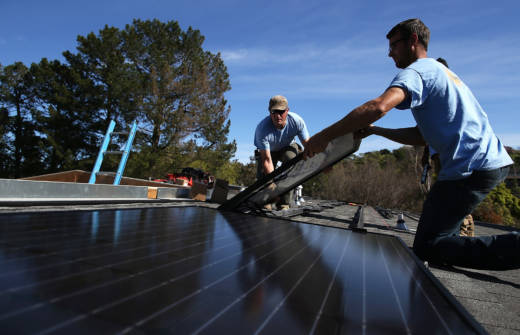Perea said some of the drop in installations has to do with the new way solar is sold. Big installers are now pushing homeowners to buy panels themselves rather than leasing them.
Installers are betting that the new business model will yield bigger profits because they plan to take on the role of lender, offering homeowners financing to buy the panels. Under the old model, revenue came from lease payments.
"It's a very easy way to get solar onto rooftops, but it isn't great from a cash-flow perspective," Perea said of the old model.
Panel leasing made up 50 percent of solar sales at the beginning of 2016 -- but today, it's dropped to 35 percent. Perea says the new system is meant to bring in more revenue for the companies, but right now it's costing them sales instead.
And California is ground zero for the outcome of these changes. "When we see such an outsized reduction from these large national installers, it really has an outsized impact on the state," he said.
California is also switching to a new formula by which utilities rebate solar homes for excess energy they send to the grid. The new formula will likely reduce those rebates, making solar panels less attractive.
Solar homes will likely receive less money for excess energy sent in the mornings and evenings, so-called time-of-use rates. These rates are still being figured out by utility companies, so solar installers can't quote them to potential customers -- which might be turning them away, Perea explained.
New solar customers will also pay a one-time "interconnection fee" of between $75 and $150 -- depending on the utility -- to connect solar panels to the grid.
And new "non-bypassable charges" will add 2 to 3 cents per kilowatt hour of energy that solar residents buy from their utility company.
Yet part of the dip in installations in the first quarter can also be explained by rain.
The past winter's storms made it harder to both install and sell solar panels, said Bernadette del Chiaro, executive director of the California Solar Energy Industries Association.
"If you're in the construction industry, that actually puts a damper on the ability to get up on a roof and make an installation happen," she said.
But even with lower rates in the first quarter, California still made up more than a third of national solar installations, according to GTM.

